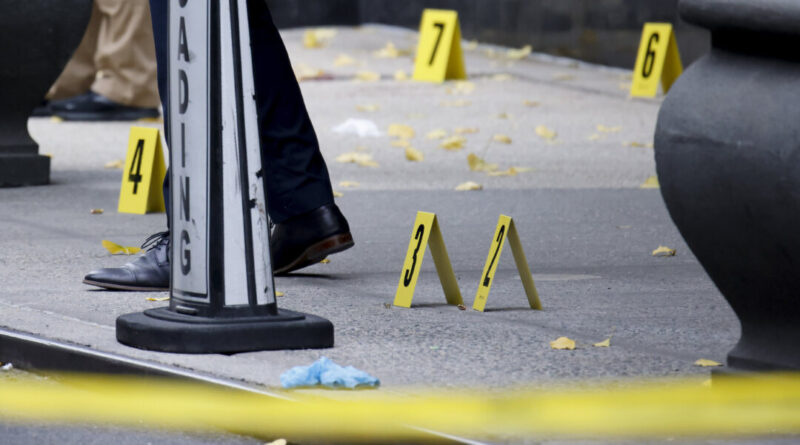Companies Enhance Security Measures Following Surge in Threats After UnitedHealthcare CEO’s Killing
“Wanted” posters featuring the names and images of health care executives have emerged across the streets of New York. Online, hit lists displaying bullet imagery are being shared, accompanied by warnings that industry leaders should be on high alert.
The evident targeted shooting of UnitedHealthcare CEO Brian Thompson, along with the threatening messages that ensued, has created a wave of unease throughout corporate America, particularly within the health care sector, prompting many executives and employees to enhance their security measures.
In the aftermath of the shocking incident, various health insurers have eliminated details regarding their top executives from their corporate websites, postponed in-person shareholder meetings, and urged employees to temporarily work from home.
This week, an internal bulletin from the New York Police Department indicated that the online backlash post-shooting could signify an immediate “elevated threat.”
Authorities are concerned that the shooting on December 4 could “inspire a range of extremists and grievance-fueled individuals to resort to violence,” according to the bulletin, which was authenticated by The Associated Press.
“Wanted” posters affixed to parking meters and construction site barriers in Manhattan displayed pictures of health care executives alongside the phrase “Deny, defend, depose”—a phrase reminiscent of markings found on bullets discovered near Thompson’s body, mirroring sentiments expressed by critics of the insurance sector.
Paulette Thompson, the CEO’s wife, informed NBC News last week that he had mentioned having received threats and suggested that these may have been tied to issues regarding insurance coverage.
Investigators are exploring the possibility that the shooting suspect, Luigi Mangione, acted out of animosity toward health insurers. They are examining his writings, which discuss a prior back injury and express animus toward corporate America and the U.S. health care system.

Suspect Luigi Mangione is taken into the Blair County Courthouse on Tuesday, Dec. 10, 2024, in Hollidaysburg, Pa. Benjamin B. Braun/Pittsburgh Post-Gazette via AP
Mangione’s attorney has warned against jumping to conclusions regarding the case. The 26-year-old is currently incarcerated in Pennsylvania after being arrested on Monday, with Manhattan prosecutors working to extradite him to New York to face murder charges.
UnitedHealthcare’s parent company, UnitedHealth Group, stated this week that it is cooperating with law enforcement to maintain a secure work atmosphere and is reinforcing security protocols and building access regulations, as confirmed by a spokesperson.
The company has removed images, names, and biographies of its top executives from its online platforms, as reported by a spokesperson. Other entities, including CVS, which owns the insurance giant Aetna, have followed suit.
Centene Corp., a government health insurance provider, has declared that its investor day will be conducted online rather than in person as initially intended. Meanwhile, Medica, a nonprofit health care company based in Minnesota, announced it would temporarily close its six offices for security reasons and switch employees to remote work.
These heightened security protocols could lead to reduced accessibility for health care companies and their leaders to policyholders, according to former Cigna executive Wendell Potter.
“And understandably so, given this act of violence. There’s no guarantee that a similar incident won’t occur again,” remarked Potter, who is now an advocate for health care reform.
Private security firms and consultants have seen a surge in demand, receiving inquiries shortly after the shooting from businesses across diverse sectors, including manufacturing and finance.
Organizations have historically faced security threats and have deliberated on the extent to which they should protect high-profile executives. However, the recent threats stemming from Thompson’s murder cannot be trivialized, emphasized Dave Komendat, a former security chief at Boeing, who now operates his own risk management firm.
“The climate and public response to this tragedy are distinct. It’s crucial that this situation be taken seriously,” Komendat stated.
Only about a quarter of Fortune 500 companies reported expenditures for safeguarding their CEOs and high-ranking officials, with the median cost for personal security having doubled in the last three years to slightly below $100,000.
Shortly after the shooting, Komendat participated in a call with numerous chief security officers from major companies, and similar discussions have continued since, organized by security organizations and law enforcement agencies evaluating the threats, he noted.
“It only takes one person inspired by a poster—someone who may have endured a harmful experience with one of these companies in their past,” Komendat added.
By Devna Bose and John Seewer





